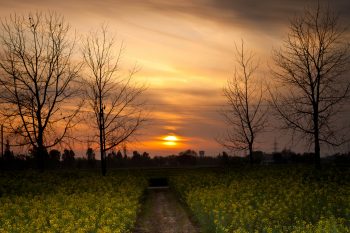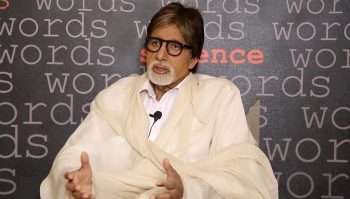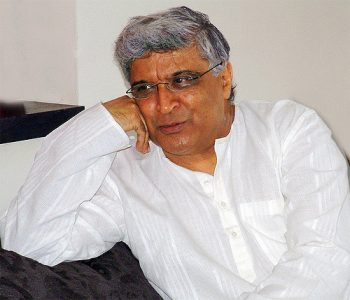Sahir Ludhianvi: A Poet of the Silver Screen (Part 1) Posted by Rachael on Oct 9, 2017 in Hindi Language, Uncategorized
In the world of Hindi-Urdu literature and popular film, Sahir Ludhianvi’s (साहिर लुधियानवी) name stands out as one of the most gifted and insightful poets of the 20th century. Born Abdul Hayee (अब्दुल हयी) in 1921 in Karimpura/करीमपुरा, Ludhiana (लुधियाना, a district in the state of Punjab), Punjab/पंजाब (in what was then British India), Sahir Ludhianvi (his pen name) went on to become one of India and Pakistan’s most celebrated poets as well as a film lyricist. He won numerous awards for his work, including two Filmfare Awards for Best Lyricist for the films Taj Mahal/ताज महल (1963) and Kabhi Kabhi/कभी कभी (Sometimes or From Time to Time, 1976) and received his crowning achievement, the Padma Shri/पद्म श्री, India’s fourth-highest civilian honor, in 1971.
In his early years, he attended college at the Government College in Ludhiana. Even then, he became popular amongst his peers for his beautiful ghazals (ग़ज़ल, fem. noun, a type of Urdu poetry), nazams (नज़म, fem. noun, another type of Urdu poetry) and passionate speeches about a variety of topics. In this way, he is not unlike Amitabh Bachchan’s character in Kabhi Kabhi/कभी कभी, who rouses a crowd of college-going students with his poignant song, “मैं पल दो पल का शायर हूँ” (Main pal do pal kaa shaayar huun/I am a poet of an instant):
“मैं पल दो पल का शायर हूँ/Main pal do pal kaa shaayar huun
I am a poet of (only) an instant,
पल दो पल मेरी कहानी है/Pal do pal meri kahaani hai,
My story (too) is fleeting,
पल दो पल मेरी हस्ती (fem. noun) है,/Pal do pal meri hasti hai,
My existence is (only) momentary (हस्ती/hasti can also mean worth or merit)
पल दो पल मेरी जवानी है/Pal do pal meri javaani hai.
My youth, (too), is of an instant.
मुझसे पहले कितने शायर आए,/Mujhse pehele kitne shaayar aaye,
So many poets came before me,
और आकर चले गए,/Aur aakar chale gaye,
And, once they came, went away,
कुछ आहें भरकर लौट गए,/Kuch aahe bharkar laut gaye,
Some returned, breathing sighs,
कुछ नग़मे गाकर चले गए/Kuch nagame gaakar chale gaye,
Some left, singing sweetly,
वो भी एक पल का किस्सा थे,/Voh bhi ek pal kaa kissa the,
They too were a story of only a moment,
मै भी एक पल का किस्सा हूँ,/Main bhi ek pal kaa kissa huun,
Just as I am a fleeting tale.
कल तुमसे जुदा हो जाऊँगा, जो आज तुम्हारा हिस्सा हूँ/Kal tumse judaa ho jaaungaa, jo aaj tumhara hissa huun
Tomorrow I will be separated from you, of which I am a part, today.
कल और आयेंगे नग़मों की खिलती कलियाँ चुननेवाले,/Kal aur aayenge nagamo ki khiltee kaliyaan chunnevaale,
Tomorrow more will come, who pluck songs like blossoming flower buds,
मुझसे बेहतर कहनेवाले, तुमसे बेहतर सुननेवाले,/Mujhse behtar kehnevaale, tumse behtar sunnevaale,
Those who are more eloquent than I, and better listeners than you,
कल कोई मुझको याद करे, क्यों कोई मुझको याद करे,/Kal koi mujhko yaad kare, kyoon koi mujhko yaad kare,
Tomorrow someone may remember me, (but) why should they remember me,
मसरूफ़ ज़माना मेरे लिए, क्यों वक्त अपना बरबाद करे/Masroof zamaana mere liye, kyoon vakt apnaa barbaad kare.
The age (world) is too busy for one such as me, why should I squander my time.
In 1943, Ludhianvi moved to Lahore (in 1947, the year of India’s Independence, this would become part of Pakistan), and it was while living there that he published his first work in Urdu, entitled Talkhiyaan/तलख़ियाँ (Bitterness, 1945). Besides his own work, he was heavily involved in the world of Urdu literature and edited numerous magazines in Urdu, such as Adab-e-Lateef (अदब-ए-लतीफ़), Shahkaar (शाहकार), Prithlari (प्रीतलड़ी) and Savera (सवेरा). He was also a member of the Progressive Writers’ Association. Subsequent to India’s independence, while still living in the newly-formed Pakistan, the country’s government served him with an arrest warrant for controversial statements he made in support of communism. It was these experiences of government repression as well as his longing to be reunited with his friends in India which, as a secular state, was more tolerant of controversial opinions such as his, that urged him to move to Delhi in 1949.
Soon after, Ludhianvi shifted to Bombay to work in the film industry based there. It was his work as a film lyricist which made him immensely well-known and beloved and enabled him to have a certain measure of financial stability. In the 1970s, after several successes in the film world, he was able to build a bungalow in the Andheri/अंधेरी suburb of Bombay, which he named Parchaiyaan/परछाइयाँ (Shadows), a namesake of one of his poetic works. Although he never married, one of his most important partners was Amrita Pritam/अमृता प्रीतम, who is known especially in the Hindi world as a talented poet, novelist and essayist. In 1980, Ludhianvi died from a sudden cardiac arrest (no doubt brought on by his heavy smoking and drinking) with his friend, famed film lyricist Javed Akhtar (जावेद अख़्तर), at his side.
To end, here’s the song I mentioned above (for which Ludhianvi wrote the lyrics) from the film Kabhi Kabhi:

Build vocabulary, practice pronunciation, and more with Transparent Language Online. Available anytime, anywhere, on any device.






